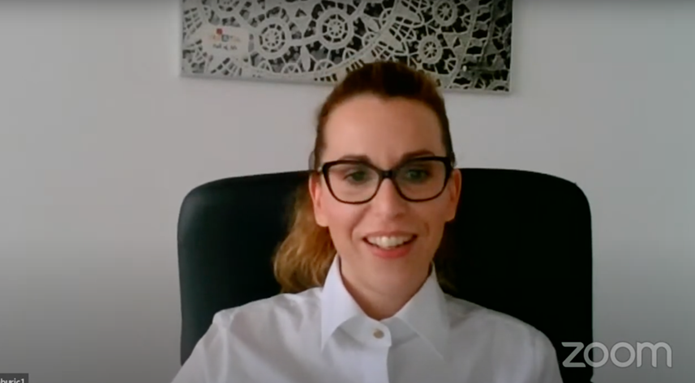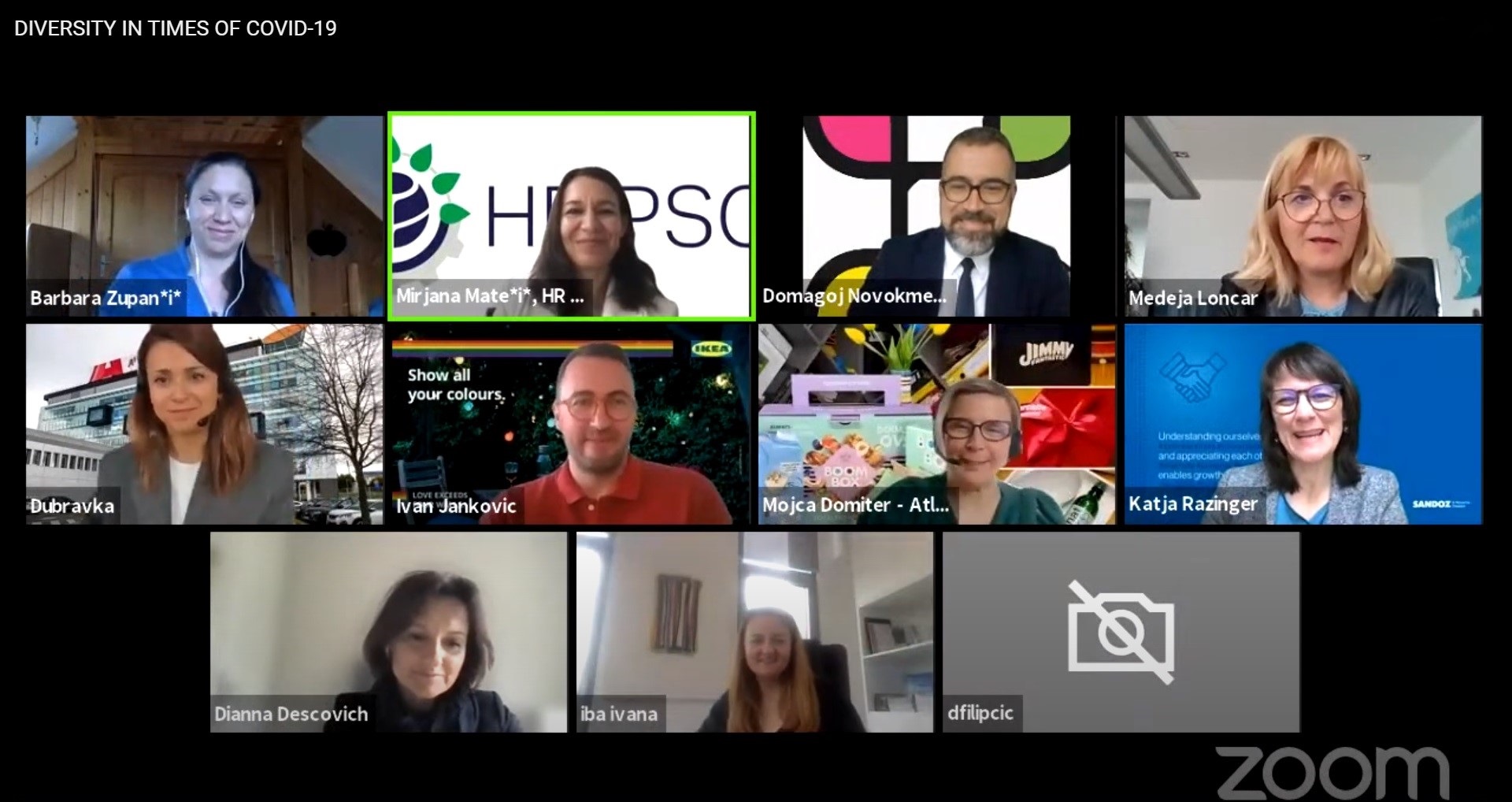To celebrate the European Diversity month, an international virtual event on the topic of Diversity in Times of COVID-19 was held on May 19th.
The event was organized by the Croatian and Slovenian Diversity Charters, with the support from the EU Commission, with the aim of promoting diversity and inclusion (D&I) in the workplace.
10 speakers were invited to the panel discussion and round table moderated by Domagoj Novokmet, and the event was followed by over 50 individuals on Zoom and more than 20 via the HR PSOR Youtube channel.
The panel began with opening remarks from ministries from both countries. Majda Burić, the Croatian State Secretary at the Ministry of Labor, Pension System, Family and Social Policy, emphasized the promotion of equal opportunities and the empowerment of women, youth and people with disabilities in the labor market. “There is no better investment than investing in human capital,” she said during her introductory speech. She also stressed the importance of reaching a balance between work life and private life.

Then Mateja Ribič, State Secretary at the Ministry of Labor, Family, Social Affairs and Equal Opportunities in Slovenia, opened the discussion about the difficulties faced by employed women during the pandemic. In most cases, women are still the main carers in the family and therefore bear the burden of private life and remote work. Ms. Ribič further highlighted an example of good practice, the ‘Action Dad’ initiative that promotes an active participation of men in fatherhood and the equal distribution of paid and unpaid work between women and men, in order to improve working and living conditions for all generations in the labor market.

Barbara Zupančić, director of the Institute Listina raznolikosti of Slovenia, in her inspiring speech highlighted the importance of empathy and the sense of belonging and togetherness for all members of society during crises such as a COVID-19 pandemic as a primary guideline for the successful and sustainable development of society. She finalized the speech with an inspiring question for all: “Isn’t diversity and inclusion a true love story; and will we (as a society) ignore or accept love and harmony?”.

Mirjana Matešić, Director of the Croatian Business Council for Sustainable Development (HR BCSD), emphasized that, although the EU Commission has been committed to combating discrimination and promoting diversity for many years, the COVID-19 pandemic posed a significant threat to the D&I of vulnerable groups in society. She then highlighted the problem of lack of understanding of Croatian companies in how to integrate diversity, the fight against discrimination and the protection of minorities and vulnerable groups in their agendas. Ms. Matešić further motivates organizations of all kinds in Europe to put the topic of diversity on their agenda, especially in these difficult times. Research shows that diverse teams are generally more successful in finding innovative and radical solutions, both for the pandemic and the climate change crisis, and are key in achieving sustainable businesses and overall development.

Representatives of companies in Croatia and Slovenia were then invited to join the panel discussion and share their experiences and good practices in their diversity policies during COVID-19.
Medeja Lončar, CEO of Siemens d.d. Croatia and Slovenia, opened the round table discussion, sharing the key challenges she and her company faced during the pandemic, as well as some innovative crisis management measures. She stressed the importance of open communication in the new virtual environment as the primary solution to achieve a sense of belonging in the workplace. She said mentoring can be an important tool for ambitious young women with children – sometimes it is enough to just be human and listen to your employees. She also noted the dangers of employee burnout; “You don’t have to be perfect,” she addede.

Mojca Domitar, People and Culture Executive Director for Atlantic Grupa, also stated the importance of solidarity and communication with vulnerable groups of employees during a pandemic and the shift to remote work. She especially highlighted employed parents, children, people with illnesses or disabilities. At the same time, she noted the problem of feeling isolated or non-belonging of individuals living alone, and how different socio-economic backgrounds can affect remote work. In her speech, she stressed that superiors must be open to new solutions, “Try, test and find what works best (…) there is no perfect solution,” said Ms. Domitar.

Dubravka Štefanac Vinovrški, Corporate Communications Director A1 Croatia, shared some of many difficulties for employees in the tech industry and her experiences in turning temporary work-from-home orders into a long-term strategy. As an example of good practice, Ms. Štefanac Vinovrški pointed out that management must ensure strong leadership, tolerance, transparent and continuous communication and strong team spirit, “prove support to employees” she warned. She noted that some changes in the way of working are irreversible and emphasised the value and efficiency of creating a space for cooperation and brainstorming.

Ivana Budin Arhanić, Vice President of Business development and Corporate affairs for Valamar Riviera, shared her experiences and the problems the tourism industry faced during the pandemic. She explained a job protection program as Valamar’s first priority and stressed the importance of showing solidarity and empathy for employees, stakeholders and management during the crisis. She also mentioned the company’s success in building an admirable workplace culture and work values as pro-active measures in the fight against future crises. She then clarified that tourist offers must change in line with demand. She emphasizes the advantages of D&I in teamwork as well as in creating innovative and competitive offers and products. As priorities for the future, she included the creation of attractive career opportunities and the professional development of young people in tourism.

Katja Razinger, Country Head Slovenia for Marketing and Sales Slovenia (Sandoz Commercial Operations) and Diversity and Inclusion Champion for Sandoz Region Europe, shared her experiences during the pandemic. She pointed out the benefits of teamwork during the crisis, but also the tremendous importance of a sense of security among employees. She highlighted several examples of good practice in D&I as a workplace culture. “Diversity is a competitive advantage,” said Ms. Razinger, noting the success of diverse teams and collaboration between teams in creating innovative solutions. Employee mental health, safety and trust must be a priority. She also mentioned the struggles of finding the work-life balance. They established the “Choice with responsibility” initiative, which allows employees flexible working hours, provided that they remain productive. She also emphasized how important it is to relax and organize team building activities, such as a virtual culinary course.

Ivan Janković, People and Culture Delivery Manager and Equality, Diversity and Inclusion Leader for IKEA SEE, explained the impact of the pandemic on the retail industry. He noted the enormous pressure of the COVID-19 pandemic on the entire working ecosystem – suppliers, employees, customers. He shared several examples of good practices in order to build and maintain the company’s resilience and overall resilience during crises. He first pointed out the initiative to provide free professional psychological support to all employees during the pandemic, and especially after the earthquake in Zagreb, which became one of the primary employee support strategies. He then highlighted the “Me day” initiative, a ‘no questions asked’ day off for employees to focus on their mental health and overall wellbeing.

Finally, Ms. Matešić mentioned the importance of international cooperation, learning from each other and promoting diversity within companies.
Overall, the panel discussion highlighted the impacts of the COVID-19 pandemic and the changes it brought to employees’ work and mental health. We also heard a lot about how companies have responded to these new challenges in different ways. However, a commonality in all the various strategies we heard in the panel is that employee wellbeing has always been the first priority. This has enabled a joint and collective overcoming of all challenges, but also the preservation of successful business under these new conditions.
Video on YT-u: https://www.youtube.com/watch?v=vxgGyhtes1s
#D&I #poveljaoraznolikosti #listinaoraznolikosti #EUdiversitymonth #europeancommission #hrpsor #dop #dobreprakse #diversitycharter #goodpractises

